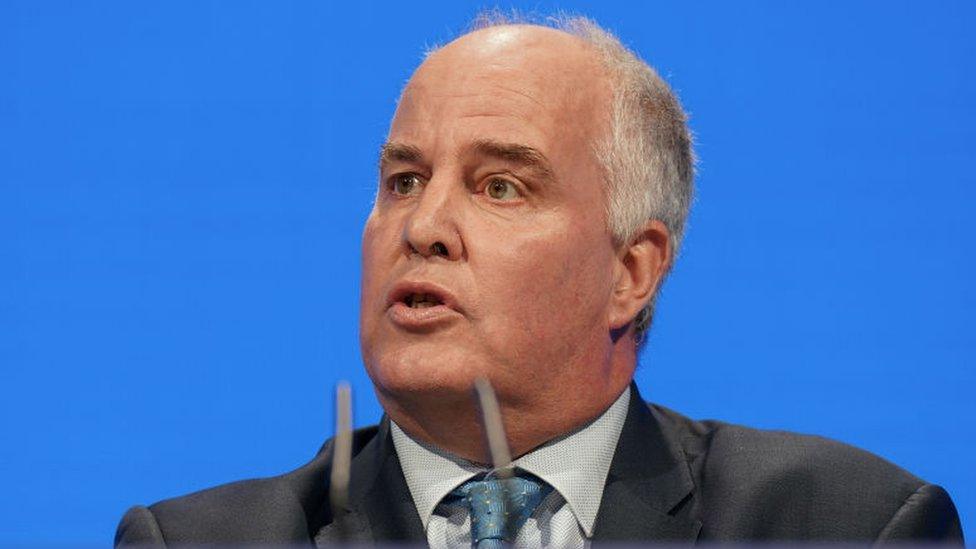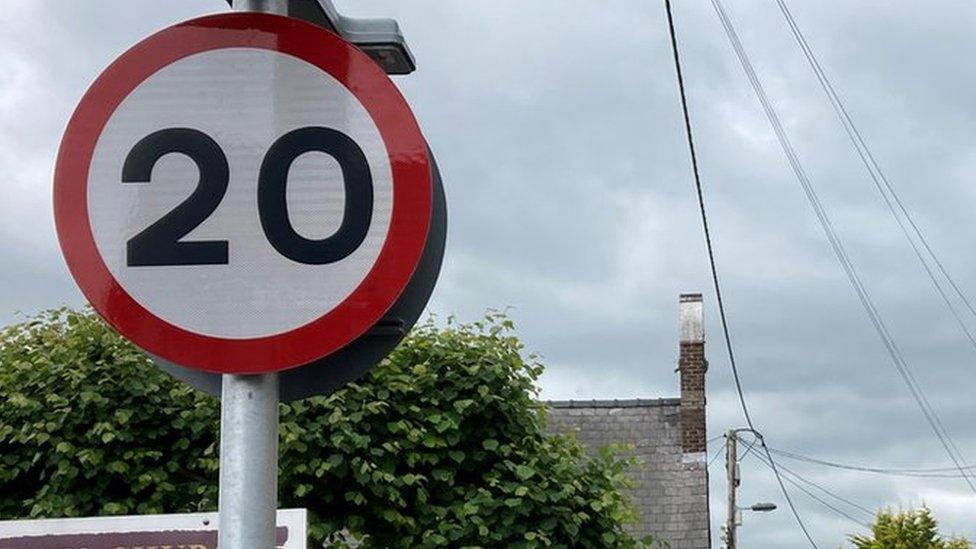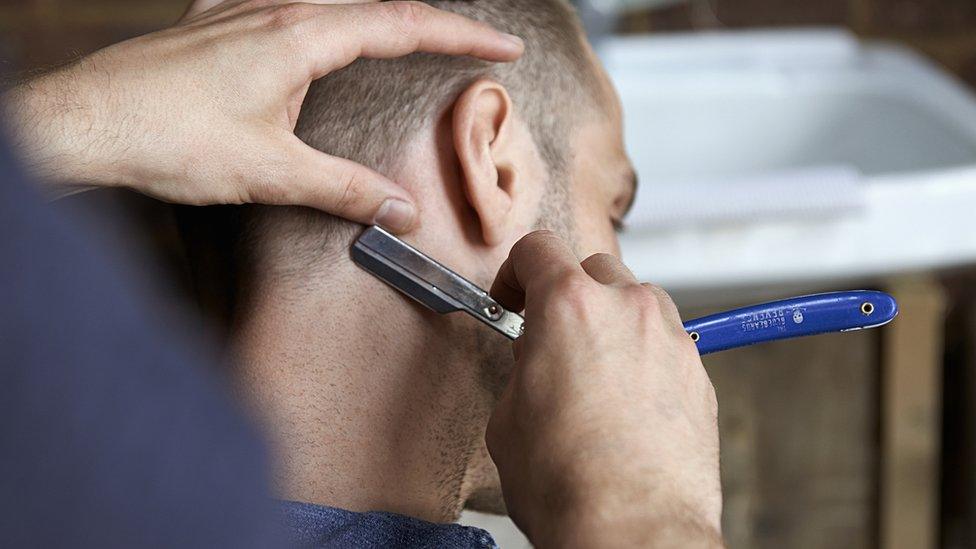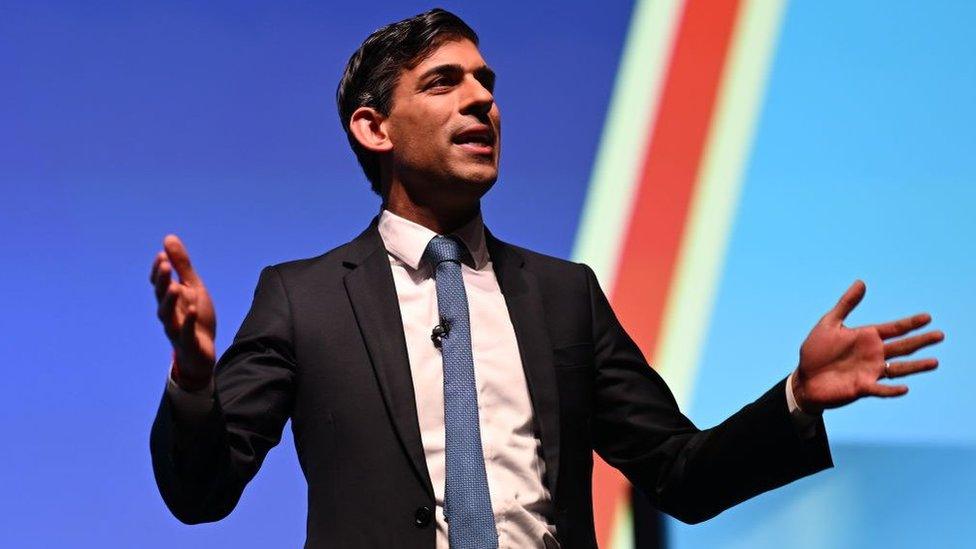Labour to blame for public service cuts, says Welsh Tory leader
- Published
- comments

Andrew RT Davies began his second stint leading Conservatives in Cardiff Bay three years ago
Welsh public services are struggling due to Labour ideology, not inadequate UK government funding, the Conservative Senedd leader has told party members.
At the Welsh Conservative conference, Andrew RT Davies said millions of pounds to be spent on expanding the Senedd should go to the NHS instead.
Labour, with Plaid Cymru backing, wastes time, energy and resources on the wrong priorities, he argued.
Mr Davies addressed the event, in Llandudno, on Friday afternoon.
Earlier in the day Prime Minister Rishi Sunak gave his support to protesting farmers, saying: "We've got your back."
Labour ministers say their funding, largely from the Conservative UK government, is insufficient for the "extreme pressures" Wales faces.
"Instead of hiring more doctors, nurses and teachers, Labour wants to hire politicians," Mr Davies told the gathering.
"Their plans for Senedd expansion are a typical Labour vanity project.
"It'll cost £120m. That cash should be going to our Welsh NHS."
Documents from Labour ministers estimate it could cost as much as £17.8m extra on average a year to increase the number of Senedd members from 60 to 96.

Different choices could give NHS Wales a multi-million pound cash injection, says Mr Davies
The Conservatives are the second-largest party in the Senedd with 16 members, behind Labour's 30 seats in the current chamber of 60 MSs.
In his speech, Mr Davies accused Welsh ministers of imposing new 20mph default speed limits in built-up areas "regardless" of their potential economic damage.
"They've admitted it'll hit the Welsh economy by up to £9bn," Mr Davies said.
"To Labour and Plaid, ideology matters more than common sense, because they have the wrong priorities."
A "central estimate" in government analysis of the economic impact of slower journeys by commuters and people who drive for a living was a hit of £4.5bn over 30 years.
But the study acknowledged there was "significant uncertainty" over the figure and "active professional debate" about how it was calculated.
Between 40 and 440 lives could be saved over 30 years, the research estimated, under a policy both Labour and Plaid Cymru committed to at the last Senedd election three years ago.

The new speed default limit has applied to 37% of the Welsh road network since mid-September
Mr Davies also gave a flavour of what Welsh Conservatives plan to put before voters at the next Welsh Parliament election, in 2026.
It will include scrapping "Labour and Plaid's barmy 20mph speed limits" and investing in the Welsh NHS "by ending the scandal where Labour takes cash from the health budget to fund its vanity projects".
"We'll get rid of Labour's road building ban - that's stopped vital infrastructure projects like the M4 Relief Road and A55 improvements - to get Wales moving," he said.
The Welsh government's National Transport Plan requires future road projects to not increase carbon emissions, nor the number of cars on the road, to not lead to higher speeds or negatively impact the environment.
Mr Davies promised to give "small and medium sized businesses a fair deal" on business rates.
"In Labour Wales - a typical pub pays £6,000 more in business rates than its counterpart in England," he will say.
"We'll reform the system to end this injustice."
From April, business rate relief for pubs, shops and restaurants in Wales will be reduced from 75% to 40%.
It remains at 75% in England, where business rates are set by the UK government.
'Daft, divisive and destructive'
The Tory MS criticised both candidates in the current Welsh Labour leadership contest, to decide who replaces the outgoing First Minister Mark Drakeford next month, predicting they will simply "give Wales more of the same".
Looking ahead to the general election, due within 11 months, Mr Davies said voters face a choice between "strong leadership from Rishi Sunak, or letting Keir Starmer impose Mark Drakeford's daft, divisive and destructive policies on the whole UK".
Speaking to BBC Wales on Thursday, ahead of the conference, Mr Sunak joined criticism of Welsh ministers' proposed changes to farm subsidies.
Describing the plans as "damaging" and "shocking", he accused Welsh Labour of risking the food supply security of the UK.
The Welsh government insists it is listening to farmers' concerns and wants safe food production systems, a protected environment and to address the climate and nature crises.

MOMENTS, MUSIC AND NOSTALGIA: Wynne delves into the archives of the 1980s
MEN UP: Five ordinary Welshmen embark on a surprising medical trial

- Published28 July 2023

- Published8 February 2024

- Published28 April 2023
